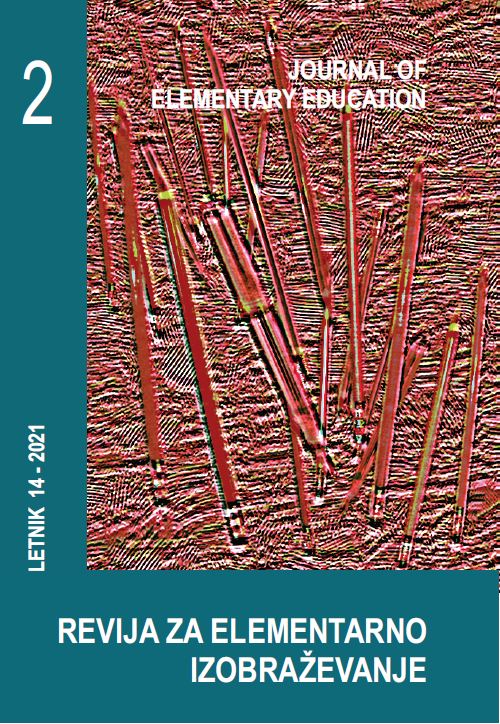Signs of a Catastrophe: Predicted Shortage of Teachers of Lower Secondary Science and Technics and Technology in Slovenia
Abstract
The paper provides evidence as a baseline for action to prevent the educational catastrophe that would result from the predicted shortage of STEM teachers in lower secondary schools in Slovenia. Based on the data, obtained from the relevant institutions, we can predict that, without a change in educational policy towards encouraging students to choose the teaching of STEM subjects as a career, the number of STEM teachers will fall below all acceptable levels.
Downloads
References
Cedefop (2016). Skill Shortage and Surplus Occupations in Europe. Retrieved from: https://www.cedefop.europa.eu/files/9115_en.pdf (Accessed: 12th September 2020)
Dick, T. P., & Rallis, S. F. (1991). Factors and influences on high school students’ career choices. Journal for Research in Mathematics Education, 22(4), pp. 281–292.
Dorph, R., Bathgate, M. E., Schunn, C. D., & Cannady, M. A. (2018). When I grow up: the relationship of science learning activation to STEM career preferences. International Journal of Science Education, 40(9), pp. 1034–1057.
Employment Service of Slovenia (2020). Jobseekers. Retrieved from http://english.ess.gov.si/ (Accessed: 12th September 2020)
European Commission. (2015). 2015 Joint Report of the Council and the Commission on the implementation of the Strategic Framework for European cooperation in education and training (ET 2020) - New priorities for European cooperation in education and training. Retrieved from https://eurlex.europa.eu/legalcontent/EN/TXT/?uri=CELEX:52015XG1215(02) (Accessed: 12th September 2020)
Eurydice. (2012). Key Data on Education in Europe 2012. Luxembourg: Publications Office of the European Union.
Eurydice. (2018). Teaching Careers in Europe: Access, Progression and Support. Eurydice Report. Luxembourg: Publications Office of the European Union.
Feng, L., & Sass, T. R. (2015). Financial Incentives to Promote Teacher Recruitment and Retention: An Analysis of the Florida Critical Teacher Shortage Program. Retrieved from: https://files.eric.ed.gov/fulltext/ED562333.pdf (Accessed: 12th September 2020)
ILO/UNESCO. (1996). Recommendation Concerning the Status of Teachers. Retrieved from http://www.ilo.org/wcmsp5/groups/public/---ed_dialogue/-sector/documen–ts/normativeinstrument/wcms_162034.pdf (Accessed: 12th September 2020)
Millar, R. (2002). Towards a science curriculum for public understanding. In S. Amos. & R. Boohan (Eds.), Teaching Science in Secondary Schools: A reader (1st ed., pp. 113–117). Routledge Farmer.
Mishra, P., & Koehler, M. J. (2006). Technological pedagogical content knowledge: A framework for teacher knowledge. Teachers College Record, 108(6), pp. 1017–1054.
Ministry of Education, Science and Sport. (2020). Statement by Minister Simona Kustec and spokesperson Jelko Kacin on the current situation regarding the COVID-19 epidemic. Retrieved from https://www.gov.si/en/state-authorities/ministries/ministry-of-education-science-and-sport/ (Accessed: 12th September 2020)
OECD. (2003). Education at a Glance 2003: OECD Indicators. OECD Publishing. Retrieved from http://www.oecd.org/education/skills-beyond-school/educationataglance2–003-home.htm (Accessed: 12th September 2020)
OECD. (2017). Education at a Glance 2017: OECD Indicators. Paris: OECD Publishing. Retrieved from http://dx.doi.org/10.1787/eag-2017-en (Accessed: 12th September 2020)
Rules on the level of education of teachers and other professionals in educational programmes of primary schools (2011). Uradni list RS št. 109 (14.01. 2012). Retrieved from http://pisrs.s–i/Pis.web/pregledPredpisa?id=PRAV10943 (Accessed: 12th September 2020)
Ploj Virtič, M., Dolenc, K., Aberšek, B., Šorgo, A., & Kocijančič, S. (2017). Vloga in pomen Tehniškega izobraževanja v OŠ (en = The role and importance of technical education in primary schools). Maribor: Univerzitetna založba Univerze. Retrieved from https://dk.um.si/Dokument.php?id=109674 (Accessed: 12th September 2020)
SURS (2019). Republic of Slovenia Statistical office, First day of School. Retrieved from: https://www.stat.si/StatWeb/en/News/Index/8155 (Accessed: 12th September 2020)
Shulman, L. S. (1986). Those who understand: Knowledge growth in teaching. Educational Researcher, 15(2), pp. 4–14.
Šorgo, A, Dojer, B, Golob, N, et al. (2018). Opinions about STEM content and classroom experiences as predictors of upper secondary school students’ career aspirations to become researchers or teachers. Journal of Research in Science Teaching, 55(10), pp. 1448-1468. https://doi.org/10.1002/tea.21462
Organization and Financing of Education Act /ZOFVI/ (1996). Uradni list RS, št. 16 (15.03. 1996). Retrieved from http://pisrs.si/Pis.web/pregledPredpisa?id=ZAKO445 (Accessed: 12th September 2020)
Fiscal Balance Act /ZUJF/ (2012). Uradni list RS, št. 69 (31.05. 2012). Retrieved from http://www.pisrs.si/Pis.web/pregledPredpisa?id=ZAKO6388 (Accessed: 12th September 2020)
Act of Amendments of Organisation and Financing of Education Act /ZOFVI-D/ (2003). Uradni list RS, št. 79 (12. 8. 2003). Retrieved from https://www.uradni-list.si/glasilo-uradni-list-rs/vsebina/2003-01-3742/zakon-o-spremembah-in-dopolnitvah-zakona-o-organizaciji-in-financiranju-vzgoje-in-izobrazevanja-zofvi-d (Accessed: 12th September 2020)
Žužek Leskovšek, M. (2018). The Bologna reform: from concept to implementation. Retrieved from https://repozitorij.uni-lj.si/IzpisGradiva.php?lang=slv&id=102729 (Accessed: 12th September 2020)
Tomažič, I., & Vidic, T. (2009). A biology teacher–a second career choice. Acta Biologica Slovenica, 52(1), pp. 49-59.
Copyright (c) 2021 Kosta Dolenc, Andrej Šorgo, Mateja Ploj Virtič

This work is licensed under a Creative Commons Attribution 4.0 International License.
